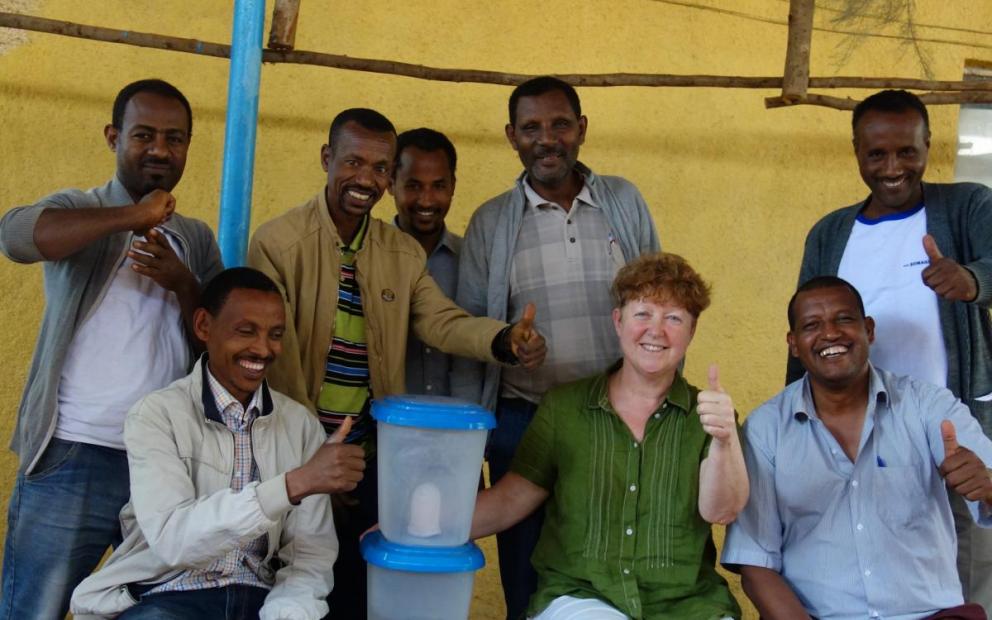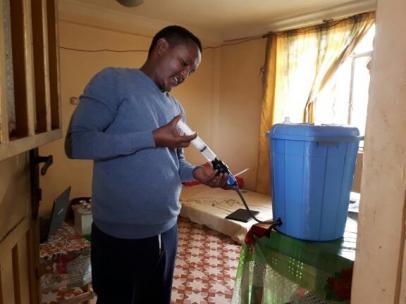The Safe Water 2 Programme is "a place for innovation," says Hester Foppen of Aqua for All. As a partner in the 'Safe Water Phase 2' Programme, IRC spoke to her about business viability and innovation at a stakeholder workshop in Nepal in the fall of 2017.
Published on: 15/03/2018

Hester Foppen, the Senior Programme Manager at Aqua For All, is one of the professionals who works for the Safe Water 2 Programme, a three-year initiative (2015-2018) aiming to increase access to safe water, particularly for people living at the base of the economic pyramid.
What is your role in the safe water business and what have been the challenges working in this business?
We are one of the partners of the Safe Water 2 Programme, which is a continuation of the work we have already been involved in with Antenna and Swiss Development Cooperation (SDC). This programme looks at how businesses can be sustainable and how they can scale up.
All of the companies consist of entrepreneurs who started safe water at the point of use projects using either chemicals or physical filtration. For Aqua for All these projects are very interesting because we are a matchmaker between investors in innovative and sustainable programmes in the field of safe water and their project owners.
What is so special about the project?
We came up with an idea that had not been done before namely to see whether existing water providers could work on point-of-use solutions. During the Stockholm Water Week 2015, we were invited by the Ethiopian State Minister of Water, Irrigation, and Electricity to do a pilot in Ethiopia because of the huge challenges they face in the field of water quality.
After the endorsement of the Ethiopian Ministry of Health during an international WHO meeting in Addis Ababa, we did a feasibility study in July 2016 to assess whether it would be economically interesting for a Water Utility to ‘finish their job’ and distribute water filters to households in their service area. This study, executed with five water utilities showed promising results. One of the Utility Heads invited us to start right away with a pilot in their town, Finote Selam, (Amhara Region) (77,000 inhabitants).
The Finote Selam Town Water Utility is aware of the fact the water they are supplying is not safe and they are struggling to find solutions. Chlorination turned out to be insufficient. They are very interested in physical filtration and want to see if they can play a role in promoting, distributing and selling physical filtration devices. We acted as an intermediary between the utility company, which is a public-sector partner, and the filter suppliers to create an extended supply chain. The utility company took on the role of promoting the filters, which was something that required political courage. They had to be very transparent and tell people: “Although we supply drinking water it is not completely safe. But you can help solve this problem by buying devices that we offer you at a good price.” They also committed to set up an installment approach of up to 4 months for payment to make the filter products inclusive.
The results
We completed a Baseline Survey and a Mid Term Review of the small pilot study in Ethiopia and discovered that the people who bought the water filters and used them were very happy with the product, the taste of water and the service given by the utility. They think the utility is transparent because they explain what the quality limitation of the water is and they offer a sustainable solution. This would not have been possible without the Safe Water Programme.
At the same time, the local government has taken this approach to a higher level of scaling up. For the pilot, we signed a MoU between the partners of this Public Private Partnership: the Water Utility, the Private Sector suppliers and Aqua for All as a facilitator. Now, this approach is being scaled to all the district levels and all utilities of West Gojjam Zone (2,4 million people) and has the ambition to be scaled up to the national level:
So, the original 20% running costs of the utility are now distributed among the different players in this extended supply chain to reach urban, peri-urban and rural communities. The filters are paid in cash and upfront and are, even with an extra 20%, affordable for many households.

You have talked about the funding role of Aqua For All and the ‘Last Mile Distribution’. Can you elaborate on those?
There are many initiatives to sell and make HWTSS products (household water treatment and safe storage) and deliver them. But the private sector alone can never reach the scale needed because these are ‘push products’. People do not always know that they have a problem with their water quality while there are solutions. The private sector is responsible for their own marketing and promotion but if they also need to spread a public health message, it becomes too costly for them. NGOs sometimes spread this message and they are very strong in doing so but they either don’t supply filters or give them for free.
What can be your role in this?
We have a matchmaking role: there is a lot of money in the sector and there are many innovative solutions and innovative and sustainable businesses that are looking for funds. So, our role is to match these two parties.
It has been said that people do not think businesses are honest and they might not trust companies trying to sell them products to improve their water quality. Can you comment on this?
What I have seen in Ethiopia is that people do not really trust the private sector. The WHO helps the government and the Ministry of Health provides guidelines for household water treatment and safety at point-of-use.
The utility companies are trusted by the people to be experts on drinking water. The laboratory of the Regional Water Bureau of Amhara Region is there to ensure this. However, the top 10 diseases in the health institutions within the pilot project area lists water-borne diseases which are emanating from a water quality problem.
So they need private sector suppliers and there is a role for them to ensure that supply is always present and that there is an after-sales service. Aqua for All has also recruited well recognized and trusted professionals to create awareness.
How should a product be promoted?
After-sales services should be included in the service package and price, it helps people to keep using the safe water product correctly. If the product breaks down the customers can call the utility company to either bring a replacement or explain what went wrong. Afterward, these people act as ambassadors of the product because they are very happy with the service provided. It is also mandatory that the key decision makers be engaged and endorse the programme right from start and play their own role including ensuring that government is in the driver’s seat.
What advice would you give start-ups in Ethiopia?
In general, we support and promote public-private partnerships. Water is the responsibility of the government because it’s a public good but at the same time, the private sector can be very helpful in ensuring that people have a good service.
For a company to expand in a country it needs to know the context of the country and the legislation necessary to run the company there. It’s very important that the company fits in the government system, making sure that they have an operating license and all the permits they need. They also need to ensure that they are in sync with government policies. Aqua for All has supported many businesses to identify their ideas and business plan. We provide them with the support they need and help them find the necessary funding. The head of the utility company in Ethiopia we work with has three conditions:
What specifically are the after-sales services which are offered?
After-sales is when the company helps the clients when the products are not working or a filter breaks, to solve this problem. A supply chain of spare parts for sustained use should be part of the after-sales service.
Because of this service, client satisfaction is very high. People feel the company is not just selling a product but really cares about their health and they want people to be part of their own solution. This is what Safe Water is about – ‘finishing’ the job of water suppliers.

This article is based on an interview with Hester Foppen of Aqua for All during a stakeholder workshop in Nepal, September 2017. Aqua for All is a non-profit organization which applies a business approach to stimulate and scale (financially) sustainable solutions targeting the very poor in developing countries in the field of water, sanitation and hygiene-related challenges and one of IRC’s business partners in the Safe Water II Programme - a three year initiative (2015-2018) aiming to increase access to safe water particularly for people living at the base of the economic pyramid.
Acknowledgment of contributions from Tettje van Daalen [IRC], Janine de Laat and Gashaye Chekol[Aqua for All].
At IRC we have strong opinions and we value honest and frank discussion, so you won't be surprised to hear that not all the opinions on this site represent our official policy.